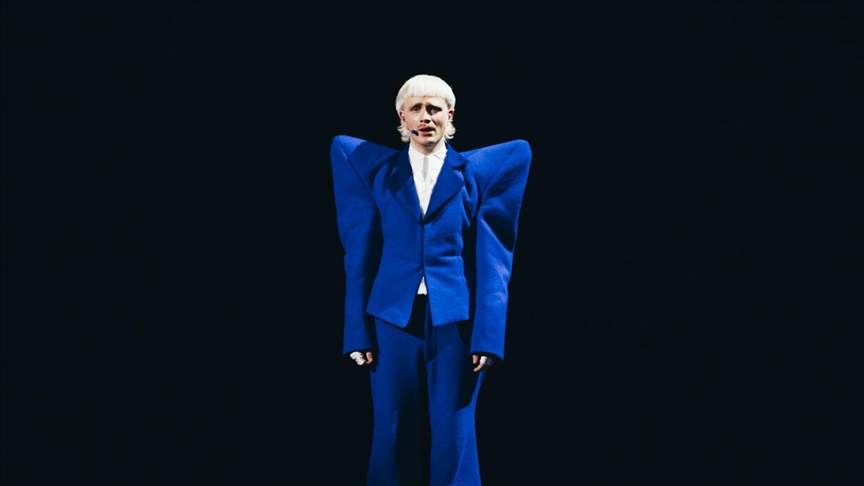Eurovision axes Dutch contestant Klein after controversial 'incident'
Organizers deny disqualification related to any other participants amid claims involving Israeli contestant
 Photo Credit: eurovision.tv
Photo Credit: eurovision.tv
LONDON
Joost Klein, the Dutch contestant at this year’s Eurovision, was disqualified from the competition Saturday over an “incident” that organizers claimed did not involve any other performers or delegation member.
The news comes after Klein was put under investigation Friday by the European Broadcasting Union (EBU) for asking Israel’s Eden Golan at a press conference to justify her participation in the Eurovision Song Contest amid Tel Aviv’s war on Gaza.
The EBU, however, claimed that their decision to disqualify Klein had to do with him allegedly making verbal threats to a female production worker at the event's venue in Malmo, Sweden, on Thursday night.
"We would like to make it clear that, contrary to some media reports and social media speculation, this incident did not involve any other performer or delegation member,” the organizers said in a statement.
"We maintain a zero-tolerance policy towards inappropriate behavior at our event and are committed to providing a safe and secure working environment for all staff at the contest. In light of this, Joost Klein's behavior towards a team member is deemed in breach of contest rules," the statement added.
The final will go ahead tonight with 25 acts, without the Dutch singer who was due to perform his track and was one of the favorites to win the competition, Europapa.
Earlier Thursday, Klein was heard pushing the Israeli contestant to answer a question by a Polish journalist on whether she thought she was causing a security risk for other participants by attending the event.
Swedish presenter Jovan Radomir quickly jumped in telling Israel’s Golan she did not have to answer the question.
To which Klein loudly responded: "Why not?"
Klein was scheduled to rehearse Friday just ahead of Golan but was prevented by the organizers. At this point, it is unclear whether he will perform in Saturday’s grand finale.
Videos on social media after the dress rehearsal on Wednesday showed the Israeli singer being booed by members of the audience because her country was allowed to participate.
Ahead of the second semi-final Thursday, thousands of pro-Palestinian demonstrators, including Swedish climate activist Greta Thunberg, took to the streets of the host city Malmo calling for Israel to be excluded.
Israel is trying to "artwash" Eurovision, by using artistic performance to distract from its actions in Gaza, said Thunberg on X.
"The world cannot remain silent in a genocide," she said.
Further protests organized by pro-Palestinian groups are expected to take place in Malmo today after Israel qualified for the final to be held this evening.
- Alternate event
In solidarity with the Palestinians in Gaza and as part of the protests, an alternate music event, Falastinvision, will be held on the final day of the Eurovision Song Contest.
Many artists from Sweden and around Europe will participate to show their support for Palestinians.
Authorities have taken extra security measures, including police with submachine guns and reinforcements from Denmark and Norway.
Meanwhile, Eurovision organizers have rebuked one of the Eurovision Song Contest 2024 opening acts for wearing a Palestinian scarf during the first semi-final night on Wednesday.
Swedish singer Eric Saade was one of three former contestants opening the contest in Malmo. He was seen wearing a keffiyeh around his wrist -- a symbol of support for Palestine to protest the Israeli onslaught in Gaza.
EBU last week decided to prevent contestants, performers, and fans from displaying Palestinian flags and pro-Palestinian symbols during the contest.
It said that those who try to enter the Malmo Arena with a Palestinian flag or a banner containing a political message will be stopped and the flags or banners will be confiscated, according to the Göteborgs-Posten newspaper.
Russia has been banned from Eurovision since Italy 2022 when Finland threatened to pull its performer unless it was banned due to Moscow’s decision to conduct a “special military operation” in Ukraine.
Iceland was fined by the EBU after its Eurovision act, Hatari, raised Palestinian flags during an appearance on the show in Israel in 2019.
In December, the board of the Icelandic Society of Authors and Composers (FTT) publicly urged Iceland’s public broadcaster RUV not to take part in the song contest “unless Israel is denied participation in the competition on the same grounds as Russia in the last competition,” FTT’s General Director Stefan Eiriksson said in a letter sent to RUV.
“We all have a duty to take a stand against war and the killing of civilians and innocent children,” he said.
He added that individuals and states “always have the choice not to put our name to such things.”
“We owe it to those nations that act with force through military might not to share the stage in an event that is always characterized by joy and optimism,” said Eiriksson.
Anadolu Agency website contains only a portion of the news stories offered to subscribers in the AA News Broadcasting System (HAS), and in summarized form. Please contact us for subscription options.




